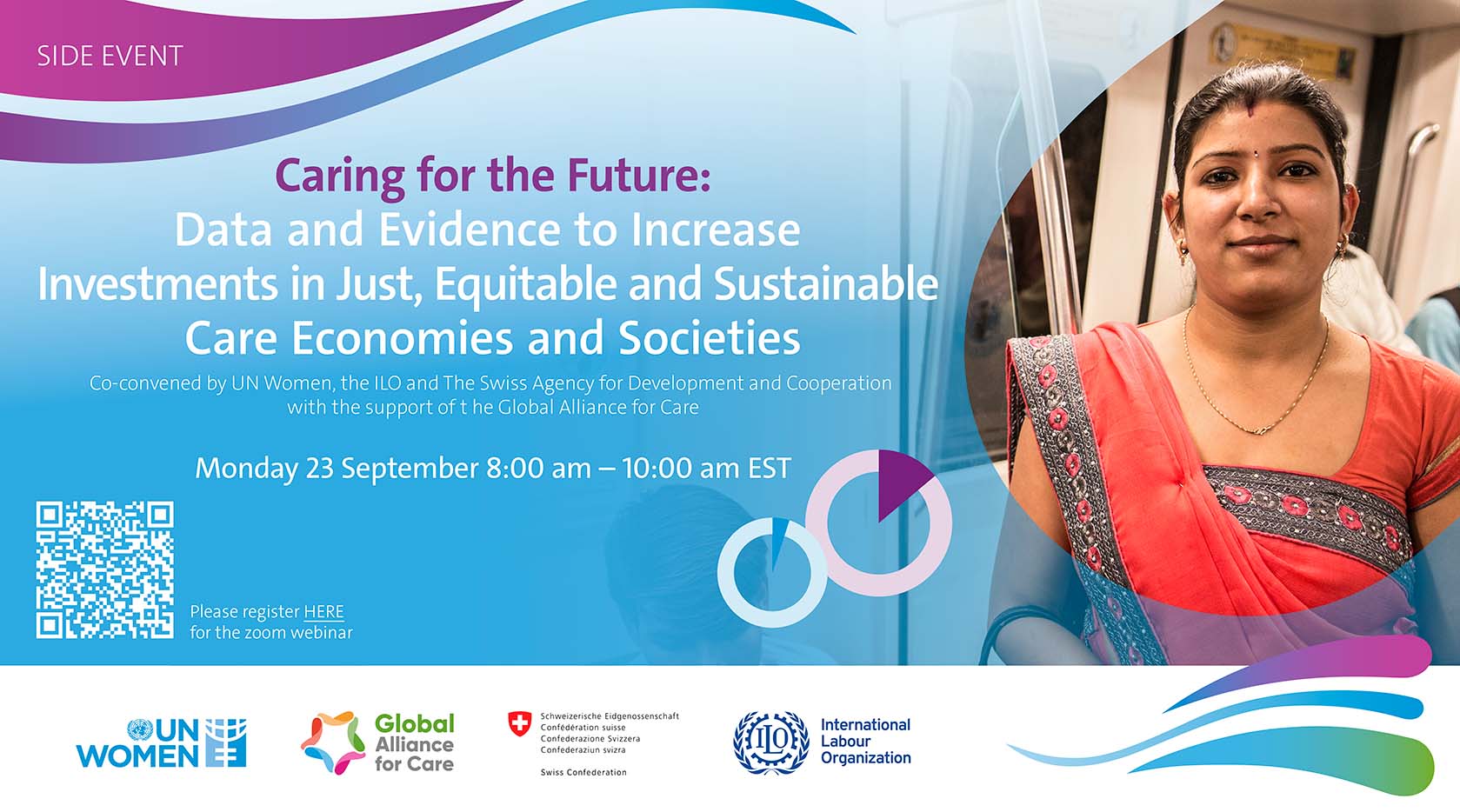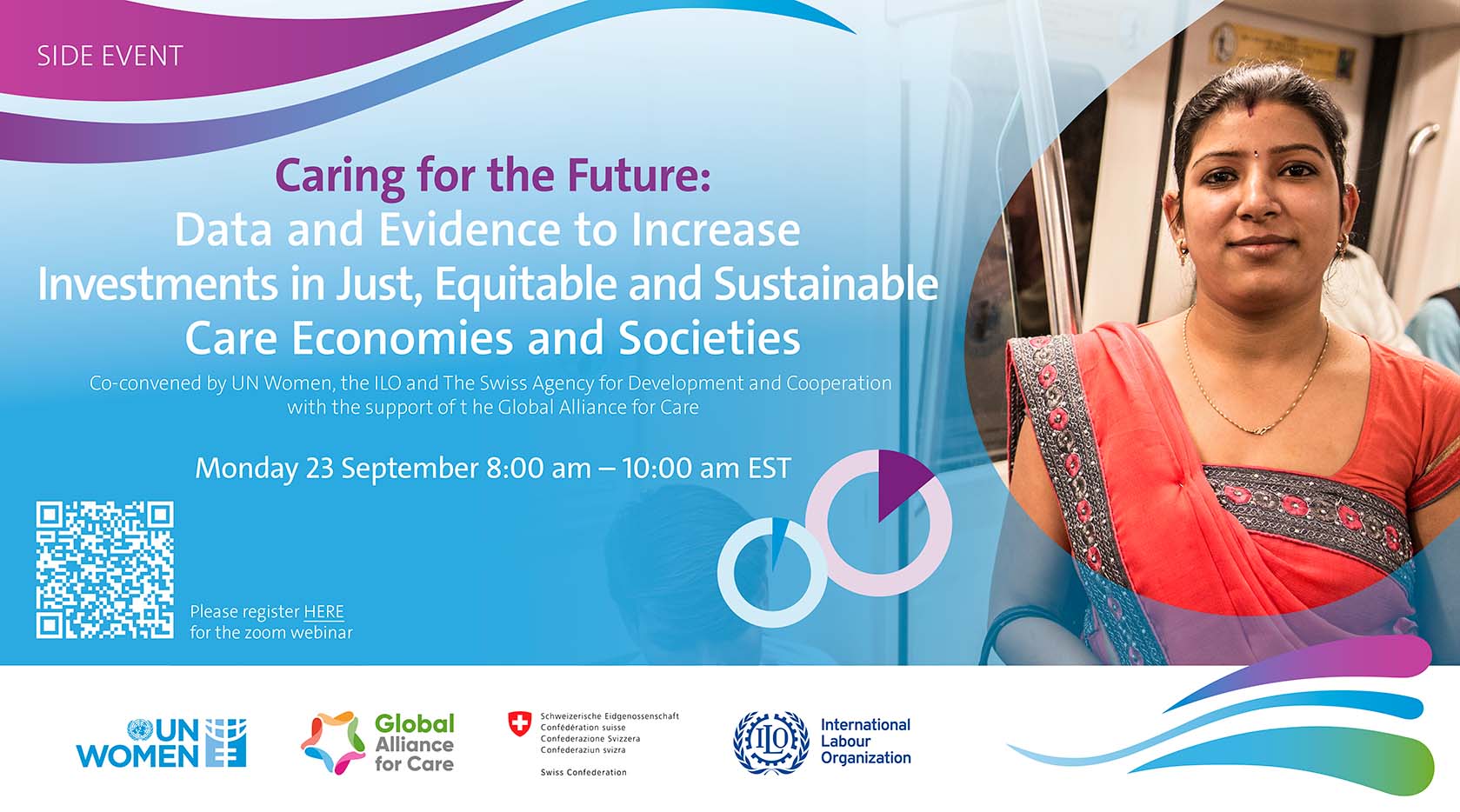
Caring for the Future: Data and Evidence to Increase Investments in Just, Equitable and Sustainable Care Economies and Societies

Event description

BACKGROUND
Care is a building block of thriving societies and economies, essential for sustaining both people and the planet's well-being. It includes all actions that nurture, maintain, and restore our world.[1] Recent crises have underscored the vital role of care services in building resilience and enabling societies and economies to withstand external shocks. The COVID-19 pandemic, for instance, showed that the unpaid care services largely provided by women and girls subsidized public sectors, such as education and healthcare.
Women and girls play a crucial role in providing caregiving services both in the household and market economy. Worldwide, women spend 2.8 more hours per day on unpaid care and domestic work compared to men. While this gap is expected to narrow slightly over time, by 2050, women will still be spending 9.5 per cent more time, or an additional [2.3] hours per day, on unpaid care work than men.2 When unpaid, the unequal allocation of care and domestic work acts as a structural barrier to gender equality and the economic empowerment of women and girls. It is one of the key drivers of time poverty among women and girls, affecting their access to education, employment, career advancement and participation in other important life spheres. Further, unpaid care work is excluded from Gross Domestic Product (GDP) calculations, further invizibilising this essential labour from economic decision-making. The paid care sector is meanwhile overrepresented by women and often characterized by low pay and status, insecure contracts, poor working conditions, and lack of social security. Closing gaps in care policies and investing in quality and affordable care services could unlock up to 300 million jobs by 2035 that particularly benefit women,[3] generate substantial earnings for women workers, and positively impact tax revenues and the self-financing potential of care investments.[4,5]
Policymakers are increasingly recognizing that investments in care policies, services, and infrastructure are crucial to the realization of gender equality and the Sustainable Development Goals (SDGs) more broadly. In Our Common Agenda[6], the United Nations Secretary-General calls on UN Member States to invest in the care economy at scale and to create decent jobs through the expansion and upscaling of quality care services. Yet data and evidence on where and how to make these investments, with what outcomes, and with what means of measuring progress, is lacking.
The Summit of the Future presents a pivotal opportunity for Member States to renew their commitment to allocating sufficient resources to close the gender gap, particularly through investments in the care economy.[7] It is also a unique opportunity to call for evidence-informed decision-making for influencing investment towards the rights and empowerment of women and girls.
In collaboration with the ILO and with support from the Swiss Development Cooperation, UN Women has developed an innovative policy tool[8] to support policymakers to identify the extent of current care service coverage gaps, estimate the investment needed to fill these gaps, and understand what the potential social and economic returns are across a range of policy objectives.
Further, the recently published report ‘Caring Societies, Inclusive, and Green Economies in Asia-Pacific. Unveiling Data to Advance Women’s Economic Empowerment Beyond GDP’, produced by UN Women aims to help governments, policymakers, multilateral organizations, the private sector and civil society in the Asia-Pacific region build consensus around a transformative agenda for WEE that catalyzes the production and use of gender data as pathways to action now and for the future.
As the world gathers to reaffirm commitments to the UN Charter and SDGs at the Summit of the Future in September 2024, this event co-convened by UN Women, the ILO, and the Swiss Agency for Development and Cooperation with the support of the Global Alliance for Care, will share tools, findings, evidence and practical lessons to advance commitments to transforming care systems through evidence-generating tools and data.
OBJECTIVE
The overall objective of this webinar is to highlight the importance of data-driven, evidence-informed policymaking while demonstrating the social and economic benefits of investing in the care economy. This will be done by:
- Showcasing the applications and country findings of a UN Women-ILO policy tool for estimating the social and economic returns of investing in care services;
- Sharing findings and insights from the Asia and Pacific Region on the production and use of comprehensive data as pathways to action for caring economies.
See also
Note:
- Transforming Care Systems: UN System Policy Paper (2024)
- UN Women and UN DESA (2023). Progress on the Sustainable Development Goals: The Gender Snapshot 2023. UN Women (2023). Forecasting time spent in unpaid care and domestic work.
- ILO (2022). Care at work
- WEF (2023). Global Gender Gap Report 2023
- UN Women and ILO (2024). Consolidated report: A guide to public investments in the care economy: Estimating care deficits, investment costs and economic returns
- Our Common Agenda Report of the Secretary-General (A/75/982)
- Summit of the Future. Pact for the future (Revision 2)
- UN Women and the ILO (2021). A guide to public investments in the care economy: Policy support tool for estimating care deficits, investment costs, and economic returns.